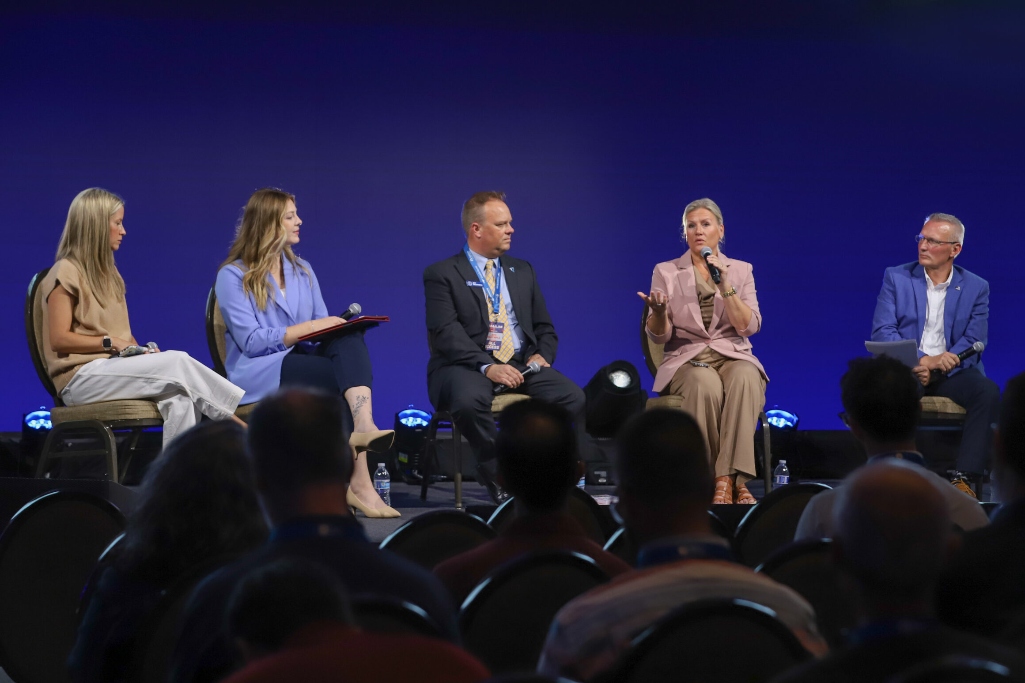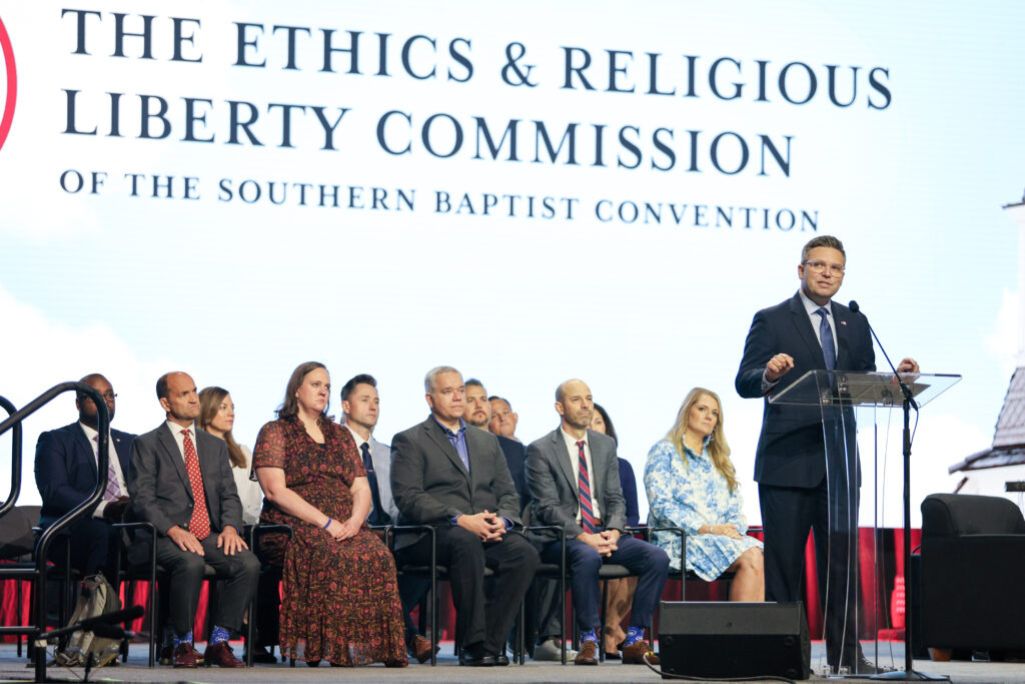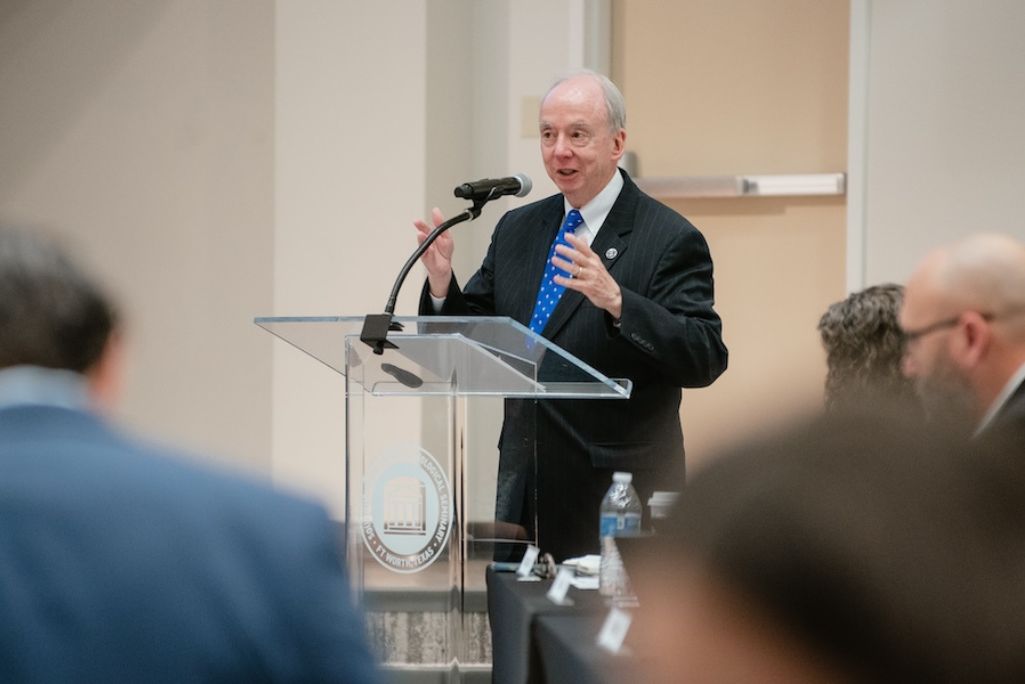
(Left to right) Courtney Reissig, Olivia Littleton, Jeff Dalrymple, Lynne Little and Matt Espenshade speak during the Safeguarding the Next Generation panel on June 9 at the Omni Dallas. The conversation, hosted by the SBC Executive Committee, focused on protecting children, equipping parents and ministry leaders, and caring for survivors in gospel-centered environments. Panelists discussed digital threats, sexual abuse, and how churches can respond with both vigilance and hope.
DALLAS (BP) — The statistics presented by a former FBI agent are shocking.
One in 7 children in the U.S. experienced abuse or neglect just in the past year, said Matt Espenshade, who formerly led the FBI’s Nashville office. Ten percent of all K-12 students experienced sexual misconduct from school employees.
And the worst: The National Center for Missing and Exploited Children investigates 36 million reports of child sexual abuse every year.
These grim facts framed a “Safeguarding the Next Generation” abuse prevention panel discussion held at the Omni Hotel’s Trinity Ballroom on June 9 before the annual meeting of the Southern Baptist Convention (SBC).
Hosting the event was Jeff Dalrymple, director of Abuse Prevention and Response with the SBC Executive Committee and former executive director of the Evangelical Council for Abuse Prevention (ECAP), a national association of Christian ministries committed to child and youth protection.
“Protecting the next generation is a Great Commission issue,” Dalrymple said. “We believe as Christ followers that every person is made unique in the image of God … worthy of dignity, respect and protection.”
Joining Dalrymple as panelists were Olivia Littleton, One More Child’s anti-trafficking team supervisor; Lynne Little, an educator and co-author of the “Safeguards” curriculum on abuse prevention and internet safety; and Espenshade, executive pastor of The Journey Church in Lebanon, Tenn. Courtney Reissig, an author, wife and mother of four sons, moderated the panel, which represented a wide range of areas of expertise, including the Christian school context, law enforcement, survivor advocacy and child protection.
Little, a professional educational consultant with Compass Education, agreed. “They are not just a number. Every child is the thumbprint of God, the imago dei.”
She noted the growth of abuse cases is due to an aggressive culture toward children as well as increasing avenues of access to children.
Noting churches are “soft targets” for predators, she said, “Misconduct is on the rise and our safeguards aren’t keeping pace.”
Dalrymple said an increase in pornography and promiscuity affects these statistics as well. He urged his listeners to call people to discipleship, which presents a way out of the sin.
“I was one of the seven in that statistic,” shared Littleton, who provides professional expertise and personal survivor testimony to support victims and survivors of human trafficking and sexual exploitation. Her abuser was a trusted person who had groomed her whole family into trusting him.
Noting 93% of survivors know their abuser, Espenshade stressed the importance of training, mandated reporting and having the right mindset concerning abuse.
“Grooming happens by master manipulators,” who are often in the church, he said, explaining perpetrators often groom whole families, gradually pushing boundaries and isolating children to begin the sexualizing process.
He expressed concern that too many parents have a “mechanics shop mentality,” in which they drop off their kids to someone else’s care without pause. He warned, “We often mistake someone’s spiritual reputation and think that that equals safety.”
He stressed the importance of training so that leaders, parents, volunteers and even children can notice the signs that something is not right.
“You have to talk to your kids about this real threat,” he emphasized. “You have to feel that sense of urgency.”
The panelists also urged vigilance over online access for children, who are often groomed through social media sites such as Snapchat, Tik Tok, Instagram and Discord, as well as online gaming systems.
Noting 90% of grooming starts online, Little said to look for the following signs of grooming behavior: children get anxious and panicked when they’re separated from their devices; they talk about an unknown “friend” online; there are dating websites and new games codes that you didn’t pay for.
“Any secretiveness and changes in (the) child may mean they are being groomed,” she said.
Espenshade said predators use the tactics of sextortion, threatening to distribute private and sensitive material to force acts of sex; artificial intelligence (AI)-generated content, taking original content and changing it through AI to portray seemingly realistic and compromising images; encrypted messages, private, untraceable conversations; and catfishing, pretending to be the same age as the victim to access and control their victims.
Littleton warned that it’s possible to “get numb because the numbers get bigger, and you think it is hopeless. But we have a good God who’s giving us hope and has given us education and community.”
She urged listeners to use compassion when learning of abuse. “Avoid more trauma. If you are receiving disclosure, you must have control of your emotions. I cannot explain how much courage the survivor has to have to share,” she said.
“Suffering is a long game, so having people in our lives to walk through every step of the way is important,” said Littleton, adding, “Trauma-informed equals Jesus-informed. We must create our approaches accordingly.”
Reissig added, “Believe the person coming to you.”
Reporting concerns is critical, Dalrymple said, noting that states have different requirements for mandated reporting, with many requiring all leaders and volunteers to be mandated reporters.
“When in doubt, report,” said Little. “Deference of that to a pastor or supervisor or school administrator does not qualify as your response.”
She admitted that many struggle with, “Is this really abuse?”
“We do a lot of second guessing,” she said. “But we are not trained to make those judgments. Pass those over to other experts who are trained.”
There is no “somebody else” on your team, she added. “Wouldn’t you have rather made the report and been wrong than to miss the opportunity to intervene in the child’s abuse?”
Each attendee received a copy of Julie Lowe’s book “Safeguards,” Eliza Huie’s book “Raising Kids in a Screen Saturated World” and other resources. Those interested in a growing list of resources to prevent abuse can visit the SBC’s Abuse Prevention & Response website at sbcabuseprevention.com.
(EDITOR’S NOTE — Shannon Baker is director of communications for the Baptist Resource Network (BRN) of Pennsylvania/South Jersey and editor of the Network’s weekly newsletter, BRN United.)


